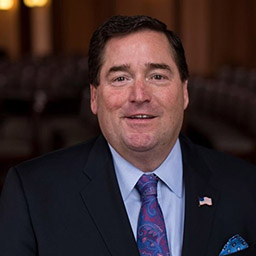Overview
"The executive branch shall consist of the governor, lieutenant governor, secretary of state, attorney general, treasurer, commissioner of agriculture, commissioner of insurance, superintendent of education, commissioner of elections, and all other executive offices...of the state."
Louisiana Constitution
Article IV, Section 1
|
The executive branch is responsible for the administration and enforcement of the constitution and laws passed by the legislative branch. The governor is the chief executive officer of the state, although the governor shares control of the state’s executive branch with a large number of other elected officials. The executive officer administers the programs and operations of state government, and therefore most directly serves the people. It provides direct services such as medical care for the poor, regulates activities such as hazardous waste disposal, supervises the provision of services by local government such as education, and promotes the state to attract new businesses. The executive branch provides support functions necessary to fulfill these responsibilities, such as purchasing, personnel, and budgeting.
Office Of The Governor
| The governor is elected for a four-year term and may serve only two consecutive terms. However, a governor who has served two terms is eligible to serve again after being out of office for one term. Serving more than half of a partial term is considered a full term. Elections for governor and other statewide elected officials are held in the year prior to the presidential election, a practice which allows voters to consider national and state issues separately. A vacancy in the governor’s office is filled in the following order of succession: Lieutenant Governor, Secretary of State, Attorney General, Treasurer, Senate president and Speaker of the House. The successor serves the remainder of the governor’s term. The same order is followed when someone is needed in an emergency to act as governor if the governor and lieutenant governor are out of state. |
 |
Legislative Powers
The governor is responsible for preparing and submitting to the legislature both a fiscal year operating budget and a five-year capital outlay program. The legislature appropriates funds for these and other purposes. The governor may veto any line item in an appropriation bill, but the legislature by a two-thirds vote may override a gubernatorial veto, but this has occurred only twice in modern times. The governor may call the legislature into special session and specify the subjects to be considered. In addition to the general appropriation bill, the governor often suggests other legislation. These “administration bills” are typically introduced by legislators referred to as the governor’s floor leaders. Administration bills usually receive serious consideration. Proposed constitutional amendments are not subject to the veto.
Judicial Powers
The governor has the right to grant reprieves, issue pardons, commute sentences, and return fines and forfeitures for crimes against the state. In this role, the governor serves as the court of last resort. Reprieves are delays in the imposition of a sentence. To commute a sentence is to reduce it, while a pardon is a full release from sentence.
Military Commander
The governor is the commander-in-chief of the state’s military forces, except when they are called into federal service. The governor may call up the National Guard in emergencies to preserve law and order, suppress insurrection, or repel invasion. Louisiana’s forces are frequently called up to assist residents in floods and hurricanes.
Executive branch agencies make rules about particular aspects of general policy.
Statewide Elected Officials
Lieutenant Governor
Billy Nungesser
The lieutenant governor serves as governor in the event of a vacancy in the office of governor or if the governor is unable to act as governor or is out of the state. The lieutenant governor is an ex officio member of any committee or board on which the governor serves. Otherwise, the lieutenant governor has the powers and duties delegated to him or her by the governor or as provided by law.
The lieutenant governor does not run for office on a ticket with the governor. In fact, the two positions can be filled by members of different political parties.
In 1986, the lieutenant governor, by law, also became the commissioner of the Department of Culture, Recreation and Tourism. The lieutenant governor was given the power to appoint, with Senate approval, the secretary and other key positions in the department formerly appointed by the governor.
Secretary of State
Nancy Landry
The Secretary of State heads the Department of State and is the state’s chief election officer. He or she is responsible for preparing and certifying the ballots for all elections, announcing election returns, administering the election laws, administering the voter registration laws and overseeing parish registrars of voters, and purchasing, maintaining, repairing and storing voting machines. In addition, the department prepares the machines for balloting and delivers them to the precincts in time for elections.

Attorney General
Liz Murrill
The Attorney General heads the Department of Justice and is the state’s chief legal officer. The responsibility of the Attorney General is to protect the rights and interests of the state. He or she has the authority to intervene in any civil action in which the state has an interest. For example, the Attorney General represented the state in its dispute with the federal government over offshore mineral rights. The Attorney General's office defends Louisiana laws against constitutional challenges in federal court.
The Attorney General has a very limited role in prosecuting criminals and cannot become involved in a criminal case without an invitation from the parish district attorney. As the legal adviser to state agencies, the Attorney General gives written advisory opinions on questions of law to state and local public officials. These opinions carry a great deal of weight but do not have the force of law. When a binding interpretation of a law is required, a suit may be filed to have the courts make a decision.
Treasurer
John Fleming, MD
The Treasurer heads the Department of the Treasury and is the custodian of state funds. The Treasurer disburses (pays out) public money as required by law and keeps a record of the money received and disbursed. The Treasurer serves as the state’s banker and invests funds in the treasury that are not currently needed in the state’s operations. The Treasurer serves as chairperson of the State Bond Commission, and is a member of the Interim Emergency Board and the boards of several public employee retirement systems. These positions can give the Treasurer substantial influence over debt, spending, and investment policies involving billions of dollars.
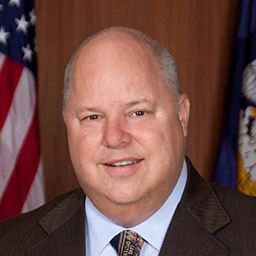
Commissioner of Agriculture and Forestry
Mike Strain DVM
The commissioner of agriculture and forestry heads the Department of Agriculture and Forestry and is responsible for the promotion, protection, and advancement of agriculture and forestry. However, some related research and educational functions are handled by other state agencies. The department oversees seedling nurseries and fire protection services for the forestry industry. The department issues and enforces regulations that protect the agricultural interests of the state, including companies that process agricultural products. The commissioner also is responsible for assuring accurate weights and measures of all raw and processed foods, for protecting agricultural products from pests and diseases, and for preventing fraudulent practices in agriculture. The commissioner serves on many Boards and Commissions which market and control agricultural products, such as the Crawfish Promotion and Research Board. Traditionally, the commissioner was elected as a representative of farmers; however, as the number of farmers in the state has dwindled, candidates have had to appeal more and more to urban voters and their concerns as consumers of farm products.
Commissioner of Insurance
Timothy J. Temple
The Commissioner of Insurance heads the Department of Insurance and administers Louisiana’s laws governing the insurance industry. The commissioner is responsible for regulating all phases of insurance and approving insurance rates charged by insurance companies. The Commissioner of Insurance examines and licenses insurance agents and brokers, approves policy forms, examines articles of incorporation of insurance companies doing business in Louisiana, evaluates complaints against insurers, receives financial reports, determines the solvency of the companies, and collects insurance premium taxes and fees. Arguments have been made for making the commissioner an appointive position.
Officers
The twelve so-called “cabinet” departments, those which are under the direct control of the governor, are each under the direction of a secretary, who is the executive head and chief administrative officer of that department. Each secretary has the option of appointing a deputy secretary, subject to Senate confirmation; however, the secretary of the Department of Public Safety and Corrections is required to appoint a deputy secretary for public safety services and a deputy secretary for corrections services, subject to Senate confirmation. Each cabinet department in the executive branch has an office of management and finance (OMF). This office is under the direction and control of an undersecretary, who is the chief fiscal and accounting officer of the entire department. However, the Department of Public Safety and Corrections has an office of management and finance for public safety services and an office of management and finance for correction services, each headed by an undersecretary. Generally each department has several statutorily created offices which are the organizational units through which programs are administered. (No such program offices are specified for the Department of Veterans Affairs.) An assistant secretary is the head of an office. Certain assistant secretaries bear other titles as well as the title of assistant secretary, such as the state librarian, the director of the Louisiana State Museum, and the commissioner of conservation.
(These officers are the assistant secretaries of the office of the state library and the office of the state museum of the Department of Culture, Recreation and Tourism, and the office of conservation of the Department of Natural Resources, respectively.) Secretaries, undersecretaries, and assistant secretaries of cabinet departments are generally appointed by the governor, with consent of the Senate, and serve at his pleasure. The Department of Culture, Recreation and Tourism (DCRT) is a significant exception to this rule, as 1986 legislation placed that department in the office of the lieutenant governor who was made the department commissioner. The DCRT officers are appointed by the lieutenant governor and the secretary performs his functions under the general direction of the lieutenant governor. (However, the deputy secretary of DCRT is appointed by the secretary.) Other exceptions relative to appointment of officers of the various departments are indicated on the organization chart on the main page. The other eight departments include the State Civil Service, which is under the jurisdiction of the State Civil Service Commission and seven departments under the jurisdiction of elected state officials. (These include five statewide elected officials, the Public Service Commission, and the superintendent of education who formerly was elected but now is appointed by the partially elected BESE Board of Elementary and Secondary Education.) The structure of these eight departments is much like that of the cabinet departments, although department officers often have different titles such as “commissioner” or “superintendent”. In some of these departments– the smaller ones – functions are consolidated in the department’s chief executive officer and his office. In these cases, structure is not detailed in the law so as not to over structure a small department. Officers of departments under elected state officials are generally appointed by the official heading that department, with consent of the Senate, and serve at that official’s pleasure.
Boards And Commissions
The executive branch includes over 500 Boards and Commissions. New boards are created every year. Boards and Commissions are sometimes referred to as the “fourth branch of government.” Most fall into the following major categories: occupational licensing, policy and advisory, higher education management, regional or local special purpose (levees, ports), marketing and promotion (strawberries, tourism), special clientele programs (deaf, aged), quasi-judicial (tax commission), and independent boards that were created to remove them from politics (lottery, casino, public employee ethics, civil service).
The state’s numerous Boards and Commissions have been given responsibility for a great number of programs. Some are purely advisory boards while some are management boards. Still others are quite independent. Some boards make rules and then investigate and decide whether the rules are being properly followed. These quasi-judicial agencies combine legislative, executive, and judicial functions. Several independent corporations or authorities have been created to allow them to operate their programs like businesses, free of some of the restrictions on other state agencies such as having to hire employees through civil service or follow state purchasing laws. The state’s lottery program is operated by such an authority.
You can view more details about the Boards and Commissions of Louisiana by visiting the Louisiana Transparency and Accountability Portal
Overview
"The number of members of the legislature shall be provided by law, but the number of senators shall not exceed thirty-nine and the number of representatives, one hundred five."
The legislative branch includes the legislature, which is comprised of the House of Representatives with a limit of 105 members and the Senate with 39 members.
Additionally, officers and employees of the two houses and other officers and agencies are responsible to the legislature. Legislators are elected for four-year terms. A 1995 constitutional amendment limits the number of consecutive terms so that anyone who has served more than two and one-half terms in three consecutive terms may not be elected to the succeeding term in the same house. The legislature convenes in Baton Rouge at the Louisiana State Capitol for regular annual sessions and may convene for extraordinary or special sessions and for veto sessions. Regular annual sessions in even-numbered years are generally limited to 60 legislative days within 85 calendar days. Regular annual sessions in odd-numbered years are limited to specified fiscal-related subjects and certain other legislation and to 45 legislative days within 60 calendar days.
The legislature is responsible for determining policy through the enactment of laws, subject to federal and state constitutional restrictions. In addition to general laws having statewide application, the legislature may also enact laws applying only to particular localities, within a number of specific constitutional limitations. The appropriation of funds to finance programs and functions of state government is a power vested solely in the legislature. Another major legislative power is oversight of implementation and administration of state programs by executive branch agencies. Legislative rules continue to be effective even when the legislature is not in session and standing committees of the legislature have authority to conduct studies and hearings during the interim between sessions.
The distribution of representation in both houses is based on population in accordance with state constitutional mandate and U.S. Supreme Court decisions. The constitution (Const. Art. III, §1) requires single-member legislative districts; that is, each of the 39 senators and each of the 105 members of the House of Representatives represents a separate district. The legislature is required to reapportion the representation in each house by the end of the year following the year in which the state’s population is reported to the president of the United States for each decennial federal census, on the basis of total population shown by such census.
|
|
Legislative Powers
The governor is responsible for preparing and submitting to the legislature both a fiscal year operating budget and a five-year capital outlay program. The legislature appropriates funds for these and other purposes. The governor may veto any line item in an appropriation bill, but the legislature by a two-thirds vote may override a gubernatorial veto, but this has occurred only twice in modern times. The governor may call the legislature into special session and specify the subjects to be considered. In addition to the general appropriation bill, the governor often suggests other legislation. These “administration bills” are typically introduced by legislators referred to as the governor’s floor leaders. Administration bills usually receive serious consideration. Proposed constitutional amendments are not subject to the veto.
Rules And Powers
Each house gauges the qualifications and elections of its members; it determines its rules of procedure, (but they may not be inconsistent with the provisions of the constitution). Each house may punish its members for disorderly conduct or contempt. It may also expel a member with concurrence of two-thirds of its elected members, requiring a new election for the vacant seat.
Qualifications for Election to the Legislature
- Age: 18
- Residence within LA: 2 years
- Residence within Legislative District: 1 year
- Term: Four Years
- Term Limits: 3 consecutive terms
- Takes Office: same day as other elected officials.
Subpoena Power; Contempt
Each house may compel the attendance and testimony of witnesses and the production. They may also order the production of written materials, commonly used for debating bills before the legislature, before any committee thereof, or before joint committees of the houses and may punish those in willful disobedience of its orders for contempt.
Officers
Each house chooses its own officers: President of the Senate and Speaker of the House of Representatives. The legislature also chooses clerical officers, the Clerk of the House of Representatives and the Secretary of the Senate, each of whom may administer oaths.
Privileges and Immunities
A member of the legislature has immunity from arrest, except for felony charges, during his attendance at sessions and committee meetings of his house and while going to and from them. Legislative members cannot be held for questioning based on their speech in the legislature.
Conflicts of Interest
Legislative office is a public trust, and every effort to realize personal gain through official conduct is a violation of that trust. The legislature has a code of ethics prohibiting conflict between public duty and private interests.
Sessions
Journal
Each house of the legislature keeps a journal of its proceedings and publishes it immediately after the close of each session. The journal reflects the proceedings of that house, including all votes. Each member's vote is published in the journal.
Quorum
No less than a majority of the elected members of each house forms a quorum in order to allow a house of the legislature to do business, but a smaller number may adjourn from day-to-day. The body of the legislature may compel the attendance of absent members.
Adjournment
When the legislature is in session, neither house adjourns for more than three days or moves to another meeting place without consent of the other house.
Passage Of Bills
The legislature enacts laws only by introducing them in a legislative session for debate and passage by vote. They propose constitutional amendments by a joint resolution introduced during a legislative session. Constitutional amendments are processed through the houses similar to a bill. Action on any proposed law is taken only in an open, public meeting.
Three Readings
Each bill must be read at least by title on three separate days in each house. No bill can be considered for final passage unless a committee has held a public hearing and reported back to the legislature on the bill.
Amendments
Bills cannot be amended so much that the original concept behind the bill is changed. Amendments are voted upon and require a simple majority vote. Once an amendment to a bill is added in one house and it is passed on to the other, the particular amendment may not be voted upon or debated in the other house.
Majority Vote; Record Vote
A simple majority of the members elected to each house of the legislature successfully passes a bill from the legislature onto the desk of the governor. A vote can also be taken on any other matter within the legislature upon the request of one-fifth of the elected members of one house.
Reconsideration of Rejected Bills
No bill rejected by the legislature in a particular session may be re-introduced during the same session without the a majority vote of the members elected to that house which previously voted against it.
|
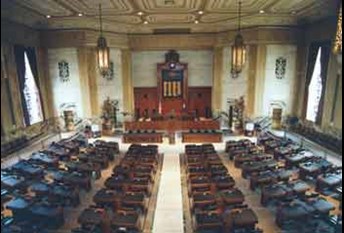
House Chamber, State Capitol, Baton Rouge
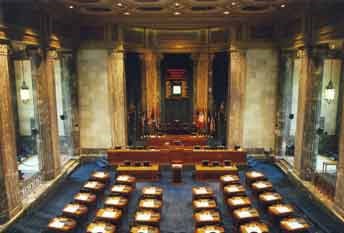
Senate Chamber, State Capitol, Baton Rouge
|
Spending
One of the legislature's main functions is in determining how and where the state spends its tax dollars, known as appropriation. The legislature must compose and agree upon a new budget yearly.
Specific Appropriation for One Year
Except as otherwise provided by the constitution, no money is withdrawn from the state treasury unless specific appropriation in legislative bills has been made. No appropriation may be made for longer than one year, or as a contingency.
General Appropriation Bill
The General Appropriation is an itemized bill that contains appropriations for the ordinary operating expenses of government, public charities, pensions, and public debt.
Origin in the House of Representatives
All bills for raising monies originate in the House of Representatives, but the Senate may propose or concur in adding amendments, as in other bills.
Extraordinary Session
A bill appropriating money in an extraordinary session (one convened after final adjournment of the yearly regular session) and also happening in the last year of the term of office of a governor, requires the favorable vote of three-fourths of the elected members of both houses of the legislature.
Local And Special Laws
Local or special laws (those outside the normal practice of the legislature) must be posted publicly for at least thirty days prior to introduction of the bill.
The legislature is generally not allowed to pass local or special laws in these cases:
- Legislating the conduct of elections, including polling places.
- Changing the names of persons; authorizing changes in the legal status of individuals or personal property.
- Concerning any civil or criminal actions, including changing the venue in civil or criminal cases, or regulating the practice or jurisdiction of any court, or providing or changing methods for the collection of debt.
- Authorizing roadway construction, except for the erection of bridges crossing streams which form boundaries between this and any other state.
- Exempting property from taxation or penalties, including interference with the tax assessor's duties.
- Regulating labor, trade, manufacturing, or agriculture; fixing the rate of interest.
- Creating, amending, or granting special privileged to private corporations.
- Regulating or funding the management or construction of parish and city public schools.
- Legalizing unauthorized or invalid acts of any officer, employee, or agent of the state, its agencies, or political subdivisions.
- Defining any crime.
- Indirectly enacting special or local laws by partial repeal or suspension of a general law.
Signing Of Bills
A bill passed by both houses of the legislature is signed by the presiding officers and then delivered to the governor within three days after passage. However, joint, concurrent, or other legislative resolutions do not require the action or approval of the governor to become effective.
Gubernatorial Action
If the governor does not approve a bill, he may veto it. A bill, except a joint resolution, becomes law if the governor signs it or if he fails to sign or veto it within a certain amount of time. Nothwithstanding veto, a bill will pass ten days after delivery to the governor if the legislature is in session, or within twenty days after delivery if the tenth day after delivery occurs when the legislature has adjourned their session.
Veto Message
If the governor vetoes a bill, he returns it to the legislature within twelve days after delivery to him if the legislature is in session. If the governor returns a vetoed bill after the legislature adjourns, it is returned to the legislature before its next session (or special session).
Veto Session
A vetoed bill can become law if, after its return to the legislature, it is approved by two-thirds of the elected members of each house. The legislature may meet in veto session in the state capital 40 days following final adjournment of the most recent session, to consider all bills vetoed by the governor. Veto sessions cannot exceed five days, and any veto session may be finally adjourned prior to the end of the fifth day upon a vote of two-thirds of the elected members of each house.
No veto session may be held if a majority of the elected members of either house declare in writing that a veto session is unnecessary. The declaration must be received by the presiding officer of the respective houses at least five days prior to the day on which the veto session is to convene.
Laws' Effective Date
Date upon which enacted bills and constitutional amendments take effect:
- Acts from an annual regular session - Unless the Act itself states an earlier or later date, all Acts become effective on August 1 after the regular legislative session during which they are adopted.
- Acts from an extraordinary session - Unless the Act itself states an earlier or later date, all Acts become effective on the 60th day after final adjournment of the extraordinary session in which they were enacted.
- Constitutional amendments - Unless the amendment provides otherwise, constitutional amendments approved by the voters become effective 20 days after issuance of the governor's proclamation that they have been adopted.
Suspension Of Laws
Only the legislature may suspend a law, and then only by at least the same majority vote it was passed with. Except for gubernatorial veto and time limitations for introduction, laws must be suspended according to the same procedures and formalities required for enactment of that law. Every resolution suspending a law specifies the period of suspension, which cannot extend beyond the sixtieth day after final adjournment of the next year's regular session.
Reapportionment
By the end of the year following the year in which the population of this state has been reported for the federal census (happening every 10 years), the legislature will reapportion the representation in each house on the basis of population shown by the census. If the legislature fails to reapportion as required, the state supreme court, upon petition of any legislator, will reapportion the representation in each house.
Auditor
The office of the Louisiana Legislative Auditor is responsible solely to the legislature. He serves as a fiscal advisor to it and audits fiscal records of the state, its agencies, and political subdivisions. The Legislative Auditor is elected a majority vote of the elected members of each house of the legislature. The Auditor may be removed by a two-thirds vote of the elected members of each house.
Overview
The judicial branch's power is vested in a Supreme Court, courts of appeal, district courts, and other courts including family courts, parish courts, and justice of the peace courts.
The judicial branch is responsible for administering the laws of the state and resolving legal conflicts. It includes the court system, comprising of Family and Juvenile Courts, the Clerk of Court, District Courts, District Attorneys, the Sheriff's office, coroners, Circuit Courts, Courts of Appeal, and the Louisiana Supreme Court.
Legal Resources
Judges
Powers of Judges
A judge may, among other court orders, issue writs of habeas corpus (the power to call any prisoner before the court to test the legality of his detention). Exercise of authority by a judge of the Supreme Court or of a court of appeal is subject to review by the whole court. The power of judges to punish for contempt of court is limited by law.
Qualifications for Judges
A judge of the Supreme Court, a court of appeal, district court, family court, parish court, or court having solely juvenile jurisdiction should have established legal residence in the respective district, circuit, or parish for one year preceding election. A judge should also have practiced law in the state for at least the number of years specified as follows:
- For the Supreme Court or a court of appeals - ten years.
- For a district court, family court, parish court, or court having solely juvenile jurisdiction - eight years.
- A judge cannot practice law while serving in office.
Judges: Election and Vacancy
All judges are elected. Elections are performed at times of a regular congressional election.
A newly-created judgeship or a vacancy in the office of a judge is filled by special election called by the governor. Until the vacancy is filled, the supreme court names temporary appointees. Temporary court appointees are not eligible for the subsequent election to fill the post.
Supreme Court
![]() 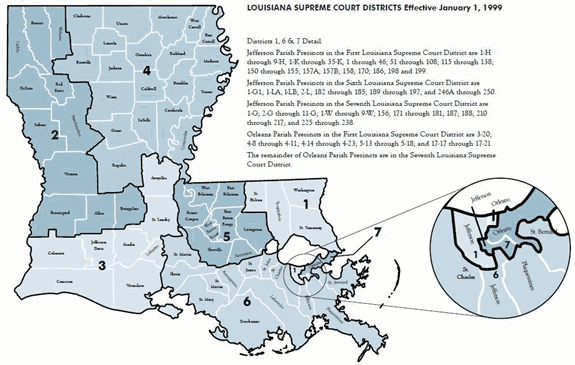 |
The Supreme Court is composed of a chief justice and six associate justices, four of whom must agree in order to render a judgment. Supreme Court judges serve ten-year terms.
Supreme Court Districts
The state is divided into seven Supreme Court districts, and at least one judge is elected from each (these are distinct from the state's District Courts, for which there are currently 40). The districts and the number of judges assigned to each are subject to change by law enacted by two-thirds of each house of the legislature.
Supreme Court's Jurisdiction; Rule-Making Power; Assignment of Judges
The Supreme Court has general supervisory jurisdiction over all other courts. The Supreme Court has sole authority to appoint attorneys as temporary or ad hoc judges of city, municipal, traffic, parish, juvenile, or family courts.
- Original Jurisdiction. The Supreme Court conducts disciplinary proceedings against members of the state bar association.
- The jurisdiction of the Supreme Court in civil cases re-considers both the law and the facts when hearing appeals. In criminal matters, its jurisdiction extends only to questions of the proper interpretation of laws.
- Besides the reasons listed above, a case may be appealed to the Supreme Court if (a) a law under which a person was convicted has been declared unconstitutional or (b) the defendant has been convicted of a capital offense and a death penalty has been imposed.
Supreme Court: Chief Justice
The judge oldest in point of service on the Supreme Court is named the state's chief justice. He is the chief administrative officer of the judicial system of the state.
|
Courts Of Appeal
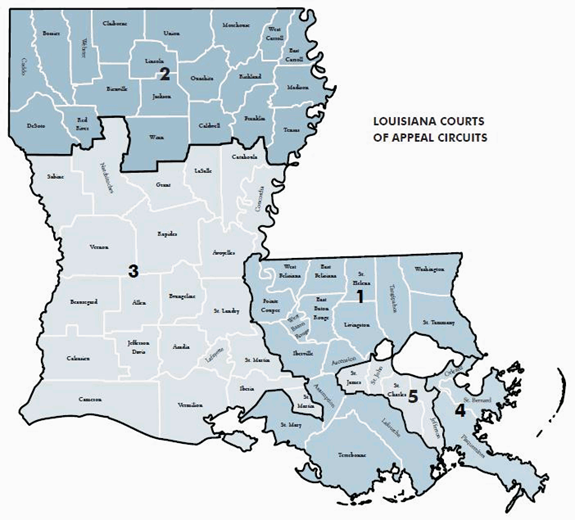 |
Circuits; Panels; Judgments; Terms
The state currently has five circuit courts, with one court of appeal in each. Each court has panels of at least three judges. The judge with the longest term of service is named chief judge.
A majority of the judges sitting in a case must concur to render judgment. The term of a court of appeal judge is ten years.
Courts of Appeal
Circuits and Districts
Each circuit is divided into at least three districts, and at least one judge is elected from each. The circuits and districts and the number of judges as elected in each circuit are subject to change by law enacted by two-thirds of each house of the legislature.
Jurisdiction
With exceptions, a defendant has a right of appeal or review of his case if he does not agree with a circuit court's ruling.
A court of appeal has jurisdiction of (1) all civil matters, and, (2) all matters appealed from family and juvenile courts, (3) most criminal cases that are triable by a jury. A court of appeal also has the jurisdiction to review and supervise cases which are heard within its circuit courts.
Courts of appeal generally do not hear new facts upon appeal of criminal cases, only questions of the lawfulness of a ruling. They are able to consider new facts, as well as questions of law, in civil cases.
Certification
A court of appeal may refer any question of law before it to the Supreme Court, and the Supreme Court then may give its binding instruction or decide the case wholly.
|
District Courts
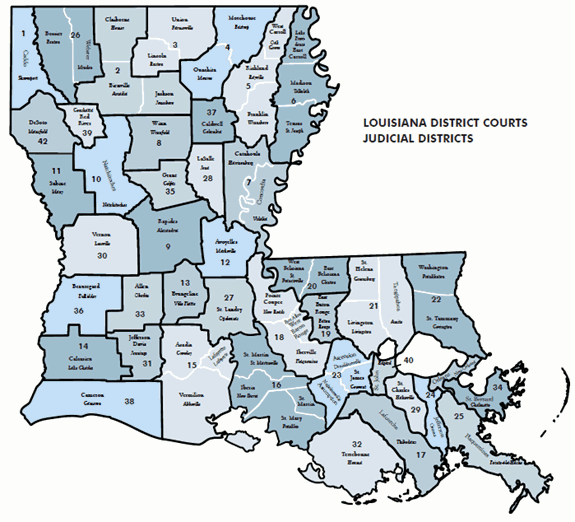 |
Judicial Districts
The state is currently divided into 40 judicial districts, each composed of at least one parish and served by at least one district judge. Each district elects a chief judge.
Terms
The district, family, juvenile, parish, city, and magistrate courts have jurisdictions and numbers that are adjustable by a 2/3 majority vote of the legislature. As of 2007, the legislature may establish new judgeships for district courts as well.
The term of a district, parish, or city court judge is six years.
Jurisdiction
A district court has original jurisdiction of all civil and criminal matters. It is the exclusive original jurisdiction of felony cases and of most cases involving property.
These types of cases are not ruled over by district courts: the right to run for office or other public position; civil or political right; and most issues of probate and succession.
Additionally in exception, a family court may have jurisdiction of cases involving property when those cases relate to disputes over community property like the settlement of claims arising from divorce or annulment of a marriage.
Juvenile and Family Courts
Criminal cases against those younger than age seventeen are referred to juvenile courts. However the legislature may provide laws for exceptions to this rule for serious cases such as murder, rape, kidnapping, drug dealing, and armed robbery.
Judiciary Commission
On recommendation of the judiciary commission, the Supreme Court may discipline or remove judges from office.
Other Judicial Branch organizations are: Mayors' Courts, Justice of the Peace Courts, Parish Courts, City Courts, Magistrate Courts.
|
District Attorneys
In each judicial district a district attorney serves a six-year-term. A district attorney must practice law for five years prior to his election. The district attorneys prosecute criminal cases within their districts, and are legal advisors to the grand jury. District attorneys may not be involved in the defense of any criminal cases.
Clerks Of Court
Clerks of court are elected to four year terms. They are responsible for keeping records of all legal proceedings. Clerks of court administer notarizations, mortgages, and other legal processes not requiring trial before a court. As well the Clerk of Court's office processes legal documentation preceding and following trial.
Justices Of The Peace And Constables
Justices of the Peace are elected to serve six year terms as the judicial authority of a ward or district, can perform marriage ceremonies have jurisdiction in civil matters when the amount in dispute does not exceed $5,000 and do not have jurisdiction when a title to real estate is involved, when the state or any political subdivision is a defendant, or in successions or probate matters. Constables are elected to serve six year terms and carry out the orders of the Justice of the Peace Court, serve citations ordered by the justice of the peace courts and act as the enforcement officer of evictions and garnishments ordered by the JP court. The Office of the Attorney General maintains an online directory of Justices of the Peace and Constables by name, title, parish and region.
Sheriffs
In each parish a sheriff is elected to four-year-terms. He is the chief law enforcement officer in the parish, as well as tax collector, with the exception of Orleans Parish.
Jurors, Grand Jury, Coroner
Jury
A citizen of the state who has reached the age of 18 is eligible to serve as a juror within the parish in which he lives. Persons who are seventy years of age or older are exempt from jury service and may decline to serve as jurors if they wish.
Grand Jury
There are one or more grand juries in each parish. They decide whether there is enough evidence for a person to be brought to trial (indictment).
Coroners
The state's coroners are members of the judicial branch. In each parish a coroner is elected for a term of four years. Coroners must generally be licensed doctors.

